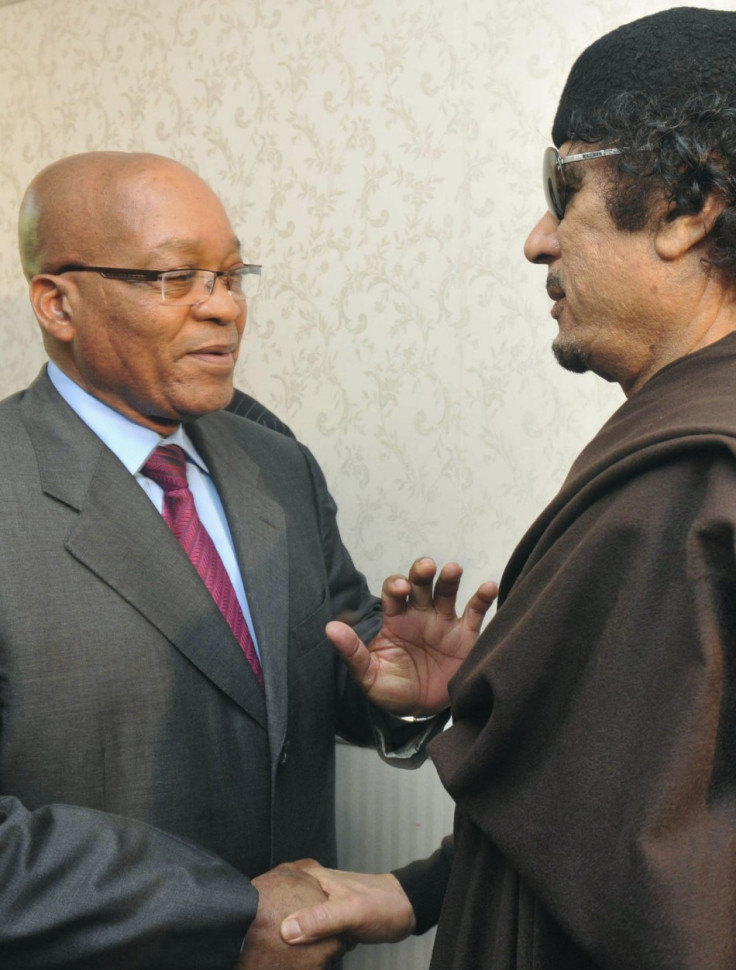South Africa Zuma meets Gaddafi but no concrete solution to the conflict surfaces

South African President Jacob Zuma arrived in Tripoli yesterday in an attempt to broker a cease fire between the Libyan rebels and their former leader Col. Muammar Gadaffi. While the first reports that emerged suggested that Gaddafi had agreed to the African Union proposal, conflicting information has since dispelled hopes that a ceasefire might be imminent. With the Nato secretary-general insisting that the Libyan leader's "reign of terror" is coming to an end, it seems that a diplomatic solution to stop the conflict now appears increasingly unlikely.
The South African President's trip came as eight Libyan army officers including five generals appeared at a news conference arranged by the Italian government in Rome. They announced they were part of a group of as many as 120 military officials and soldiers who defected from the Gadaffi regime in recent days, confirming reports that the leaders regime is rapidly crumbling.
The generals also seized the occasion to call for remaining Gadhafi loyalists in the army and security services to abandon the regime "in the name of the martyrs who have fallen in the defence of freedom". They then also accused the regime of perpetrating atrocities against civilians.
The defections came after the rebels' political leadership announced over the weekend they would offer an amnesty to those who defect from the regime.
The latest defections also come as the Nato led operation amplified its bombings and sanctions against the regime in an attempt to increase diplomatic pressure and reduce Gaddafi's movement and operational capacity. Entrenched in the conflict for now three months, Libyan forces are fighting rebel forces in the enclave around rebel-held Misrata, to the west in the Nafusa Mountains and against the main opposition forces in Brega and Ajdabiya in Libya's east.
It was clear to see that the Libyan regime had prepared for the South African leader's arrival as they had gathered a group of Gadaffi loyalists to wave flags and chant pro-regime slogans for Mr Zuma.
In Tripoli, Mr. Zuma told South African and Libyan media that Col. Gadaffi would accept an African Union proposal to broker an immediate cease-fire including an end to Nato strikes in support of rebel forces. However he forgot to mention that those terms had previously already been proposed to the rebel forces last month and were quickly rejected as the agreement did not require Gaddafi to step down from power, a condition the rebels see as essential.
"He is ready to implement the road map," Mr. Zuma said, adding that Col. Gaddafi wanted "all Libyans to be given a chance to talk among themselves" to determine the country's future.
"We discussed the necessity of giving the Libyan people the opportunity to solve their problem on their own," he added.
While reporting the Libyan leader's proposal, Mr. Zuma did not reveal any other details of the negotiations and cleverly avoided discussing whether the Libyan leader had agreed to step down. A response from rebel leaders is still awaited but the head of the rebels' National Transitional Council confirmed over the weekend that all cease-fire initiatives not predicated on the departure of Col. Gadaffi, his family and senior regime figures would be rejected, and promised the rebels would continue their offensive.
The South African president's visit was seized as an opportunity for Col Gaddafi to make his first public appearance since May 11, when he was shown meeting tribal chiefs, as Libyan TV broadcasted images of the leader welcoming Mr Zuma.
While the latter was insisting on the need for a cease fire, Nato maintained its hard-line position and reiterated the need for the leader to step down immediately. Nato Secretary General Anders Fogh Rasmussen told the press that "He is increasingly isolated at home and abroad. Even those closest to him are departing, defecting or deserting....It is time for Gaddafi to go as well."
Dismissing Nato's warning, Libyan officials have in contrast insisted that Mr. Zuma's meeting with Col. Gadaffi would offer a "breakthrough" that would aid the regime's efforts to halt the NATO bombing campaign.
However, the prospect of an African Union-backed cease-fire deal was further reduced when Russian President Dmitri Medvedev officially called for Col. Gadaffi to leave power while attending the Deauville G8 summit on Friday.
His move came as slight suprise as Russia had previously heavily criticised the legitimacy of the Nato-led operation, although it did not veto the United Nations resolution authorizing the use of force to protect civilians.
On Monday night, Nato forces continued their operation and fresh air raids on the capital were reported according to Libyan state television.
Since the African Union proved unable to come up with a solution to the conflict, Nato and the coalition's forces are holding the cards and the possibility of a diplomatic solution seems rather utopic.
© Copyright IBTimes 2025. All rights reserved.





















